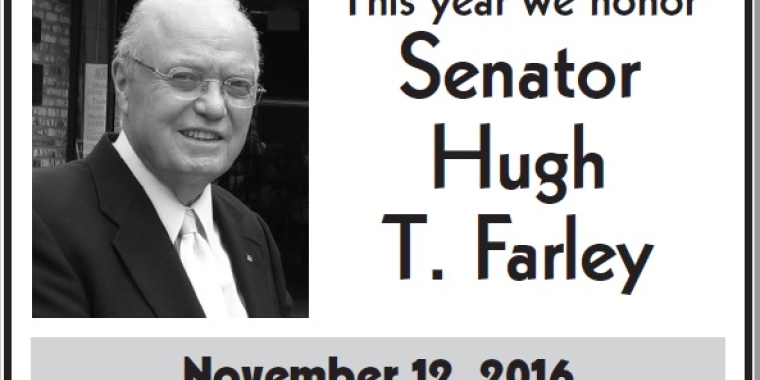
Sen. Farley Approves Bills to Cut Red Tape That Hurts Job Creation
Hugh T. Farley
June 11, 2013
-
ISSUE:
- Economic Development

State Senator Hugh T. Farley (R, C, I – Schenectady) and his colleagues in the New York State Senate recently passed 14 regulatory reform bills as the first part of a major initiative, that includes statewide public forums, to identify and eliminate thousands of costly and unnecessary government regulations that inhibit job creation and drive up local property taxes.
The regulatory reform initiative is highlighted by the creation of a Berger Commission-style Task Force. The panel will have extraordinary power to review state rules, regulations, and public authorities and make recommendations for the repeal of ones that are determined to be unnecessary. The Task Force recommendations would be binding unless they are rejected by the Legislature.
The package is designed to create a more competitive environment for businesses so they can create new jobs and grow for the future. Along with the need to deliver relief from high taxes, burdensome and unnecessary regulations continue to be a major obstacle when it comes to revitalizing New York's economy.
In addition to legislation creating the Berger Commission-style Task Force, the Senate Majority Coalition approved 13 bills, including legislation that would:
> Establish a task force to conduct a complete review of the State Administrative Procedure Act (SAPA) and regulatory review process;
> Eliminate 1,000 burdensome regulations on businesses;
> Give the Senate’s Administrative Regulations and Review Commission more oversight authority in the rulemaking process to ensure state agencies do not overstep their authority in implementing rules and regulations;
> Stop unfunded state mandates on local governments and school districts; and
> Require state agencies to provide more information on the costs and benefits of new rules.
The following bills were approved by the Senate:
S5519A establishes an 11-member, Berger Commission-style joint Task Force to perform a review and make recommendations relating to the necessity for each rule, regulation and public authority. The Task Force would be established every 10 years, beginning in 2014, to review current rules, regulations and public authorities. The panel would make recommendations the following year to eliminate rules and regulations it deems unnecessary. The Task Force recommendations would be binding, unless the Legislature rejected them, all or in part, by concurrent resolution.
S5657, creates a 19-member joint task force to undertake a thorough review of the 142-page State Administrative Procedure Act (SAPA) and regulatory review process since the Governor’s Office of Regulatory Reform has been disbanded for over two years. This law, which sets out the process used by state agencies to establish rules and regulations, was enacted in 1975 and since then, there has been no comprehensive review of the law.
S5166 directs the Governor to repeal at least 1,000 regulations that place a burden on economic development and business by April 1, 2014. This measure was included in the Senate Republican’s “Blueprint for Jobs” economic development plan earlier this year. When this process is complete, the Berger Commission-style Task Force will begin its own review of existing rules and regulations.
S1294 prohibits state mandates on local governments and school districts unless they are fully funded by the state.
S5161 gives the Administrative Regulations Review Commission (ARRC) more oversight authority in the rulemaking process and would give ARRC the authority to bring suit against an agency for a regulation that is in violation of state law.
S3462 proposes a constitutional amendment to allow the Legislature to invalidate regulations that are not consistent with legislative intent or which are likely to have a substantial unanticipated fiscal impact on the state or local governments.
S1564 requires the Regents to include certain information with respect to increased costs when altering or amending rules or regulations.
S4302A streamlines the license application and renewal process for supermarket chains and other food chain stores.
S5536 provides new incentives to facilitate the extension of existing natural gas lines to under-served businesses and consumers to spur economic development and job creation.
S5553 requires state agencies to provide expanded information on the costs and benefits associated with an agency proposal.
S1784 amends SAPA to authorize a group of businesses that are regulated by a state agency, or a representative of such businesses to petition a state agency for alternate methods of implementing a regulatory mandate that restricts the conducting or management of a business.
S3246 facilitates electronic submission of documents by allowing state agencies to substitute affirmations for sworn oaths in permit applications.
S3245 eliminates the requirement to provide free hard copies of the State Register to entities that opt to receive a free online version instead.
S2160 requires state agencies to actively solicit comments from those who may be adversely affected by a rule proposed by SAPA and seek opinions on the administrative and/or financial burdens it may place on a regulated entity.
In addition to the reform legislation, the Senate Majority Coalition will conduct industry-specific public hearings across the state. The hearings will provide the opportunity to listen to businesses and local officials and learn which rules, regulations and mandates affecting their industry are the most useless, most costly, and should be eliminated.
Share this Article or Press Release
Newsroom
Go to NewsroomGloversville Students Meet With Senator Farley
November 17, 2016

Senator Farley Chats With Students
November 17, 2016

Senator Farley Salutes Student Senators
November 16, 2016

